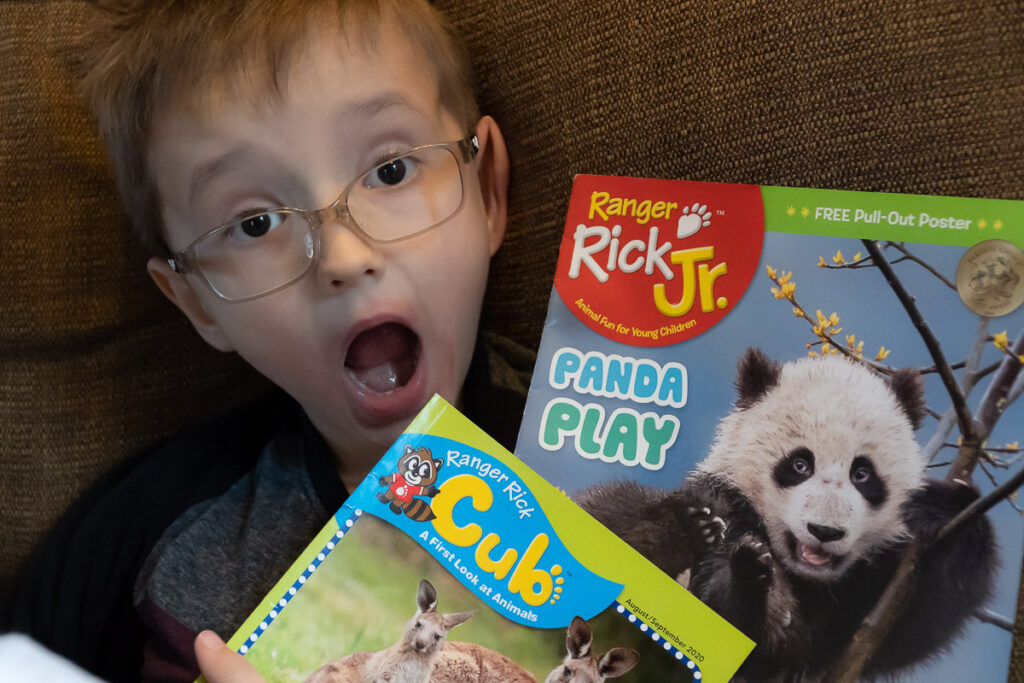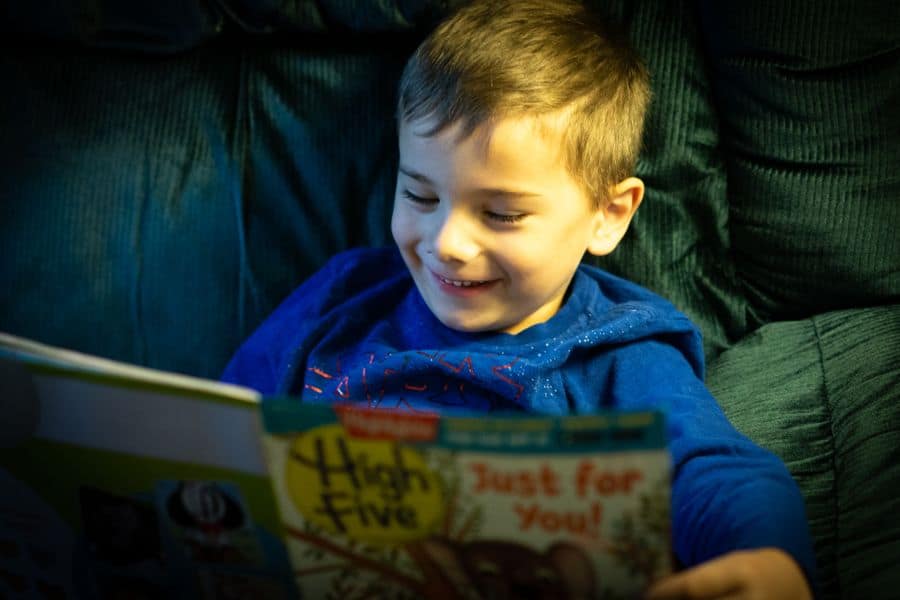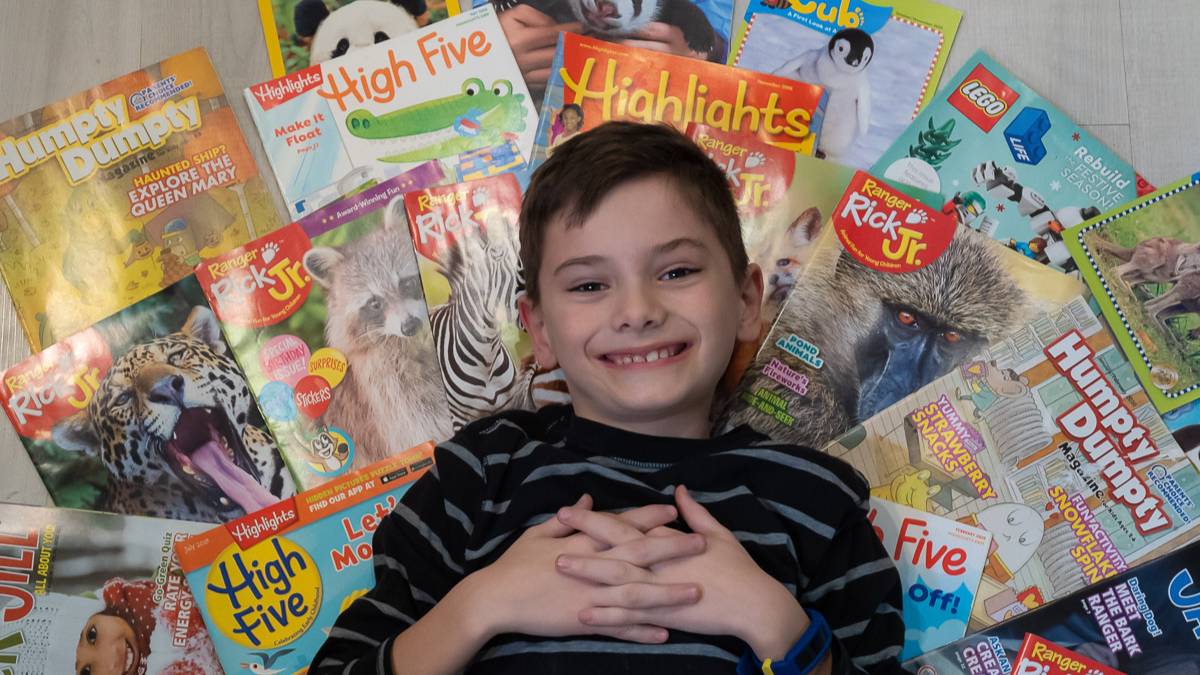Though screens are constantly competing for our kid’s attention, magazines are still alive and kicking. Educational magazines for kids are a great way to engage the minds of young readers and kickstart a reading adventure.
As parents we want magazines our kids will thoroughly enjoy; ones that teach about nature, literature, or history and science in a fun manner. Whether it’s the bite sized engaging stories, educational articles, activities, or puzzles there’s bound to be something to spark your child’s interest and imagination.
We’ve done a round up of some of the best choices available. If you’re looking for a fun and educational way to keep your child engaged, consider subscribing to one of these popular magazines for children. Let’s explore!
Ranger Rick
Ranger Rick is a magazine for children ages 7-12 that focuses on nature and the environment. It is designed to help kids learn about and appreciate the natural world in a fun and engaging way. The magazine features fun articles, nature photos, and interactive elements that encourage kids to explore and develop an appreciation for nature. Our kids love paging through the magazines just for the amazing photos of wild animals.
In addition to the print version of the magazine, Ranger Rick also offers a digital subscription that includes access to additional content such as videos, games, and interactive activities.
Ranger Rick is a great resource for kids who are interested in nature and the environment and want to learn more about these subjects in a fun and interactive way.
Ranger Rick Jr.
This magazine is designed for animal lovers ages 4-7 and focuses on nature and the environment. It features stories, cute animal photos, comics, tons of fun facts, and interactive games that encourage kids to learn about and appreciate the natural world.
There are QR codes sprinkled throughout so kids can see videos and additional content. It’s a cool bonus that kids can see some of the animals in action.

Ranger Rick Cub
If you want to introduce your kids to the world of animals and nature early, Ranger Rick Cubs has you covered. There are fewer stories here with a focus on stunning photos and cute animals.
The magazine is smaller and square for little hands and comes on a heavier stock so the pages don’t tear. Each issue clocks in around 17 pages of age-appropriate content for little kids.
Ranger Rick Dinosaurs
I wish they had this magazine when I was a kid. All the best parts Ranger Rick is best known for, just with Dinosaurs! You’ll find up to date scientific facts and illustrations.
An annual subscription is 6 issues, so you’ll get some prehistoric activity every other month.
Highlights
Highlights magazine for kids covers ages 6-12 with a wide range of topics, including science, nature, culture, and history. It features engaging articles, photos, and interactive elements that encourage kids to explore and learn about the world around them.
Highlights is famous for its hidden picture puzzles and blending activities and stories to hold kids’ interest.
Like Ranger Rick, Highlights has a family of publications geared for younger children too, and also has a bilingual version for English & Spanish

High Five
High Five is a magazine for children ages 2-6. It is designed to help young children develop important skills such as language, social-emotional development, and critical thinking.
You’ll find a mix of stories, games, and activities that are designed to be developmentally appropriate and engaging for young children. It also includes tips and ideas for parents to help support their child’s learning and development.
High Five also offers a digital subscription that includes access to additional content such as videos, games, and interactive activities.
Highlights Hello
is a magazine for babies and toddlers ages 0-2. It is designed to help young children develop important skills such as language, social-emotional development, and critical thinking. The magazine features a mix of stories, games, and activities that are designed to be developmentally appropriate and engaging for young children.
It also includes tips and ideas for parents to help support their child’s learning and development.
Overall, Highlights Hello is a great resource for parents looking to introduce young children used to reading and activities at an early age.
Related Post: Check out our full post on Highlights Magazine
Humpty Dumpty
Humpty Dumpty is a magazine for children ages 2-6 that features a mix of stories, games, and fun activities that help kids develop reading, writing, and critical thinking skills. The magazine is designed to be developmentally appropriate and engaging for young children and includes
Opening an issue of Humpty Dumpty, you’ll find a variety of age-appropriate illustrated stories, puzzles, games, cut outs, and craft ideas.
Humpty Dumpty magazine not only has a print edition but also offers a digital subscription with bonus features like videos, games, and interactive activities.
As your kids age out of Humpty Dumpty, you can move them to Jack and Jill; both magazines are from the same parent company (US Kids) and have a similar style and content.
Jack and Jill
If you’re familiar with Humpty Dumpty magazine, Jack and Jill should feel familiar. It’s like they’re Humpty Dumpty’s slightly older brother and sister, and deliver a similar experience.
Jack and Jill is a magazine aimed at ages 6-12 and covers a wide range of topics, including science, nature, culture, and history. Kids can flex their reading skills with more in depth stories and content.
Articles tend to be more topical as kids learn more about the world around them in a fun and engaging way. The magazine features engaging articles, photos, and interactive elements that encourage kids to explore and learn about different subjects and concepts.
In addition to the print version of the magazine, Jack and Jill also offers a digital subscription that includes access to additional content such as videos, games, and interactive activities.
National Geographic Kids
National Geographic Kids is an award-winning magazine geared for kids ages 8 and up. You’ll find the expected awesome animal photos as well as puzzles and games in each issue. Articles about wildlife, nature, the environment, and space will keep the kids entertained while learning.
National Geographic Kids has single issues at different reading levels, so you can make sure you’re getting a book not too easy or hard for your little reader, and find a topic they’re interested in.
We got a “level 2” edition for one of our little readers who loves pandas. The level 2 books encourage kids to read “independently with longer sentences and more complex vocabulary.” These are simple stories, though challenge new independent readers to complete the stories on their own.
Featuring a heavy print stock and large type and the stunning photographs National Geographic is known for, our kids loved it (and the book was sturdy enough to hold up to repeated readings.)
National Geographic Little Kids
As the name implies, this is National Geographic for younger kids. It is very similar, just geared for kids ages 3-6. This is great if you have a preschooler or kindergartner who loves animals.
Time for Kids
Time for Kids is a magazine for children ages 8-12 that covers current events and news topics in a kid-friendly format. The magazine features articles, photos, and interactive elements that expose kids to current real world topics and encourages them to think critically about the information they read.
Time for Kids is a great resource for kids with an interest in learning about what’s happening in the world in a fun and interactive way.
Cricket
Cricket is a literary magazine for children ages 9 to 14. It features stories, poetry, and nonfiction articles that are designed to challenge and inspire young readers. It also includes artwork, puzzles, and games.
Like some of the others, Cricket is a family of magazines offering different content and catering to different age groups: Cricket magazine is for older children, Ladybug is for younger children, and Ask is for curious children with an interest in science and nature.
Muse, Click, Ladybug, and Ask are printed under the Cricket Media banner, so readers will find it familiar transitioning from one title to another. Cricket magazine subscriptions usually include 9 issues annually.
Muse
Muse magazine is designed for children ages 9-14 and covers a wide range of science and technology topics. In any issue, you’re sure to find fun content about the latest scientific discoveries, developments, and phenomena while maintaining a sense of humor geared for tweens.
Muse is associated with the Smithsonian, so you can be sure the information and publication is quality stuff.
Also be aware that the yearly subscription includes 9 issues, so it’s not a monthly publication.
Click
Click is a magazine for children aged 7-10 that covers a wide array of topics, including science, technology, engineering, art, and math (STEM). It is designed to help kids learn about these subjects in a fun and engaging way. The magazine features articles, photos, and interactive elements that help kids explore and learn about different STEM concepts and phenomena.
Click also offers a digital subscription that includes access to additional content such as videos, games, and interactive activities.
Click is a great resource for kids who are interested in STEM subjects and want to learn more about these subjects in a fun and interactive way.
Ladybug Magazine
Ladybug is a magazine for young children, ages 3 to 6. It is filled with colorful illustrations, simple stories and poetry, and interactive activities that are designed to help children develop early literacy skills.
Ask Magazine
Ask is a science magazine for children ages 6 to 9. It features science experiments, puzzles, games, and facts that are designed to spark children’s curiosity and interest in the natural world. Features about inventors and scientist will spark interest and imagination.
Note the annual subscription is 9 issues.
Brainspace
Brainspace is geared for children ages 8 to 14. You’ll find stories and features about STEM and Art topics. The cool thing about Brainspace is that augmented reality is a key feature. You’ll want a mobile device handy to get the most out of your subscription. Hover your phone or tablet over each page for a “multi-sensory journey.”
Brainspace comes out quarterly, so the annual subscription is 4 issues.
Wrap Up – Educational Magazines for Kids
Any of these magazines are a great way for kids to learn and explore in a fun and engaging way. It’s a great way to play some games, do some puzzles, and learn to read with some compelling storytelling and high quality illustrations to round out the stories.
An annual subscription to a print magazine can be the perfect gift for young readers. They get the benefit of the gift all year and have something to look forward to in the mailbox every month. As a kid, there was something special about finding there was something addressed to me in the mailbox (flash forward to adulthood and it’s mostly just bills.)
Today, our kids look forward to seeing their name on a magazine and are excited to see what’s in the latest issue. At one point we had a bunch of these magazines arriving in the mailbox every month!
Hopefully, your little ones enjoy learning to read with kids’ magazines as much as ours did. Any of the magazines on this list is a great choice; you’re sure to make a fan of even the most reluctant readers.




